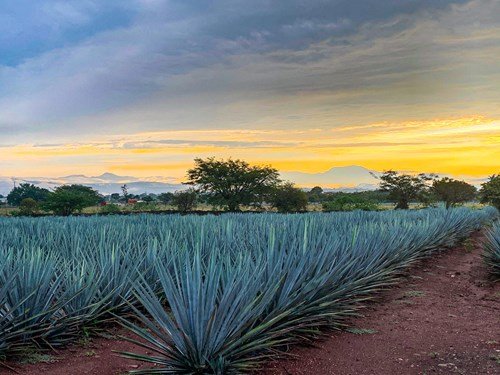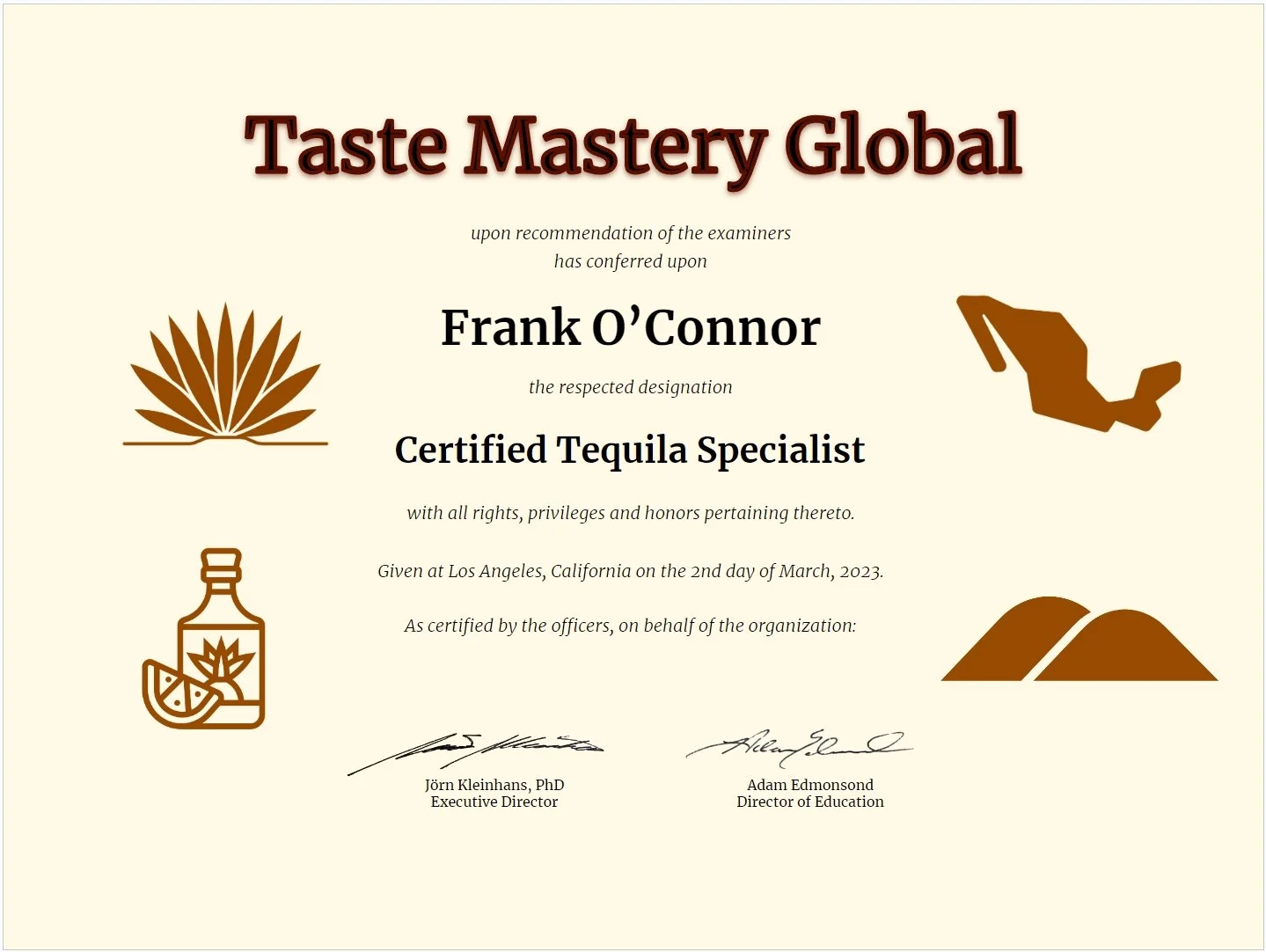Master the fascinating world of Tequila.
Program Benefits & Features
Those who pass the Certified Tequila Specialist (CTS) exam earn the life-long privilege to carry the title Certified Tequila Specialist (or in short, Tequila Specialist), use the associated postnominals CTS, and receive a beautiful diploma as shown below.
Taste Mastery Global sets a high standard for knowledge and competence in the field of Tequila and agave-based spirits. Our study and certification program is the gold standard for aspiring masters. Successful candidates have reported strongly improved career opportunities and a higher level of enjoyment based on the very best body of knowledge available.
The program removes all barriers for candidates (both hobbyists and professionals) located around the world. All studies and examinations are conducted remotely and are managed efficiently by a competent and responsive office team in Los Angeles, California.
Join our study and certification program today, and follow your passion! Become a “sommelier” in your field of interest, by taking our industry-leading examination.
Tequila, always made in the Jalisco region of Mexico from the Blue Agave plant, is among the most complex and popular spirits in the world.
From the unaged Blanco expression, via Reposado and Anejo, all the way to the highly aged Extra Anejo, the impact of oak aging creates an important aspect on the final flavor profile of each Tequila.
Technically a regional expression of mezcal, Tequila is considered a separate spirit and enjoys worldwide demand for use in mixed drinks, but is mostly served neat in the case of high quality expressions.
The production process of Tequila is elaborate: After harvest, cooking and fermentation of the plant is followed by distillation, aging and filtration.
Curriculum for the Certified Tequila Specialist™ (CTS) program:
The Blue Agave Plant
Growing Practices
Harvest
Hydrolysis
Extraction
Tequila Production
Fermentation
Distillation
Aging
Filtration
Water Dilution
Blending
Bottling
Growing Regions
Valley of Tequila
Highlands
Legal Rules
Designation of Origin
Classification
Authorized Producers
The Tequila Trade
Commercialization
Quality Control
Market Positioning
Tasting and Describing Tequila
Tasting Methodology
Tastes, Aromas and Mouthfeel
Descriptive and Evaluative Terminology
Enrollment Requirements & Process
The Certified Tequila Specialist (CTS) program is a comprehensive study and certification program, and there are no required prerequisites for program enrollment.
We welcome candidates of all backgrounds. Beginners will find the program accessible without prior knowledge, and experienced professionals or hobbyists will find the depth of the curriculum demanding and very satisfying.
The enrollment fee for the CTS study program is $495. This fee includes all necessary study materials, your online exam, as well as your printed diploma upon passing. Note that the registration fees are not refundable once 2 weeks have passed after enrollment. 70-75% of candidates pass on their first-attempt. The fee to retake the exam is $295.
You can reach our office by email or phone any time.
Find our contact information at the bottom of this webpage.
We reply swiftly and will be glad to advise you about all options.
Receiving & Reading the Study Guide
Once you enroll, you will receive an automatic confirmation email within a few seconds. In addition, you will receive an emailed welcome package with additional information within a few hours.
The study guide we provide is structured to support exactly the curriculum as outlined above. It is illustrated, clearly written, and highly rated by leading educators and candidates around the world. Anticipated study and preparation time for the exam is between 60 and 90 hours, depending on your prior knowledge and experience.
Enroll now to become a Certified Tequila Specialist:
Scheduling & Taking the Exam
As a candidate, once you are ready to take the exam, you may self-schedule a time slot on our website. A calendar invitation with all important details will be emailed to you immediately upon scheduling. Exams are offered several times each month on Fridays and Saturdays, with convenient time slots available for all global time zones.
Results will reach you via email within two days of taking the exam. The exam consists of 100 multiple-choice questions, and it takes up to 60 minutes to complete. You must correctly answer at least 75% of the questions to pass the exam.
Exam protocol:
The exam may be taken online, in a browser window, using a laptop or desktop computer.
Candidates may be located anywhere in the world, but reliable internet and phone connections are required.
No study materials or other persons are permitted in the room during an exam.
Candidates receive an email with the exam link a few hours in advance of the scheduled appointment time.
Any questions? Reach out to us using this form. We reply quickly and with clear answers.
Receiving the Diploma & Pin
Upon passing the exam, you will receive your diploma via email, on white and on crème background, for digital use or printing.
Many successful candidates take a next step and enroll in one of our other exams, building an impressive portfolio of tasting expertise that can shape their careers and enhance their personal enjoyment.
Take your first step toward certification today!
Sample Questions from our Coffee exam…the Tequila exam has a similar difficulty level
Question 1: Which of the following is a variety of Coffea arabica?
A. Typica
B. Robusta
C. Sumatra
D. None of the above
Question 2: Which of the following factors is most impactful on coffee’s development of complex aromas?
A. Soil quality
B. Fermentation
C. Resting for 30–60 days
D. Roasting
Question 3: Which of the following African countries is commonly recognized as the birthplace of coffee?
A. Tanzania
B. Uganda
C. Ethiopia
D. None of the above
Question 4: The grind size of coffee beans most appropriate for making espresso is:
A. Coarse
B. Medium
C. Fine
D. It depends on which espresso drink one is making.






